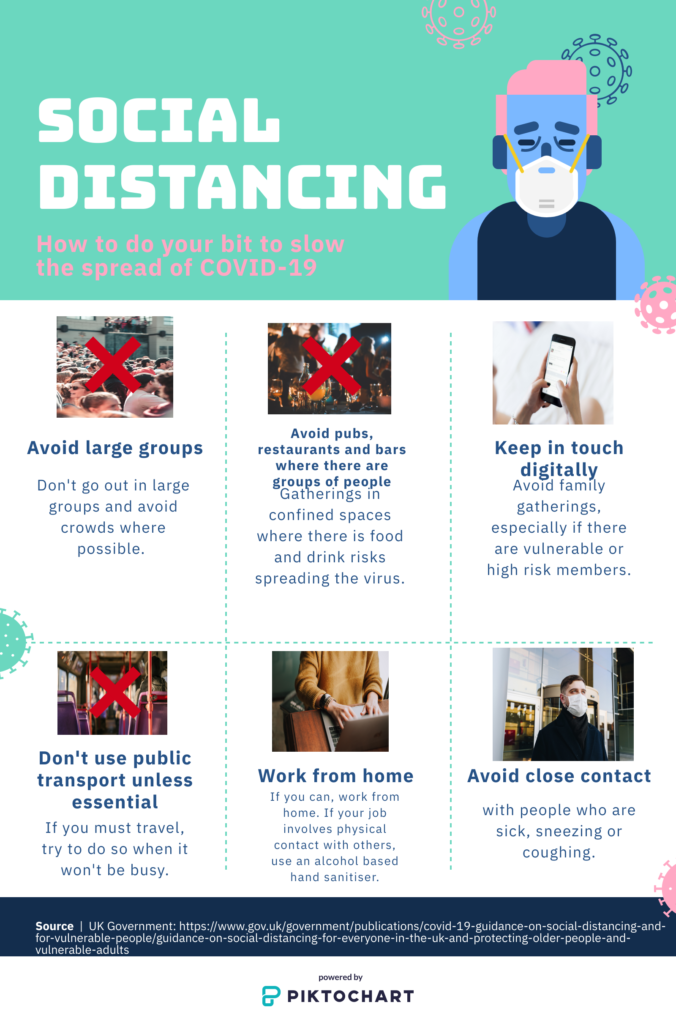With the UK facing a potential lockdown, here are some tips on how to make a success of being stuck inside.

“Self-isolation” doesn’t sound fun. “Lockdown” even less so. Quarantine? It’s like being in an apocalypse movie, and this is just the beginning.
Unfortunately, a lockdown in the UK is seeming inevitable and for many, this will mean being stuck inside, either alone or with others.
Gatherings in public will be banned and contact limited to those you live with, a measure called “social distancing”, aimed at flattening the curve of infection and protecting the NHS.
Does this fill you with dread? You won’t be the only one.
While Instagram and Facebook might be filled with fluffy depictions of harmonious family life, or of seemingly productive and organised people working from home, the reality is likely to be far less idyllic.

Queue the arguments over the ever-growing mound of dirty dishes, the stress of slow home internet, and the desperate pleas for the kids to please go to bed.
Wondering how to cope? Here are five tips to stick by when you’re stuck indoors.
1. Keep in touch with family and friends

Social isolation has been linked to an increased risk of depression, which is why checking in on family and friends is so important.
We’re social animals and rely on each other for our emotional wellbeing. Luckily, modern technology makes it easier to keep in touch now more than ever.
Phone calls and video calls to friends and family through Skype will help curb feelings of loneliness, and will be more important than ever to vulnerable groups such as older people who are more likely to be isolated.
Jinghui Tian, a 50 year old Chinese woman who was quarantined for fourteen days in a hotel, said that talking to her family helped her to combat the loneliness.
“Talking to my family through the internet has been helpful. They encourage me a lot.”
“Don’t panic,” she said. “It’s better to call your family and talk to them.”
2. Try to organise your day

Creating a schedule for yourself or your family may help to provide the structure lost when you’re isolating at home.
Using a schedule, you could set aside time each day to exercise, which the NHS advises for maintaining a healthy immune system. As per current guidance, it’s okay to go outside as long as you keep a distance from others.
A schedule may also be particularly beneficial if you have young children whose routines have been disrupted by school closures.
Lily, a TikTok blogger, is originally from Hubei province in China, where the first outbreak was reported last year. She now lives in California and is in self-isolation, keeping touch with her family via the internet.
Her videos have a large audience of children due to the demographic of TikTok users. With this in mind, she has used her platform to spread information and positivity.
Lily’s number one tip for self-quarantine is to create a daily routine.
“Let’s keep up with our work, study and daily exercise, even when we’re indoors,” she said.
3. Keep yourself entertained

With so many forms of entertainment at our disposal, such as Netflix, YouTube and gaming consoles, keeping boredom at bay should be straightforward in 2020.
Several games are due for release in the coming months, including Animal Crossing: New Horizons for the Nintendo Switch and the much anticipated The Last of Us 2.
Although many shows, such as BBC’s Eastenders and the Netflix-favourite Peaky Blinders have been forced to postpone filming, there are many bingeworthy shows to be found when you’re feeling the bite of boredom.
Yichan Li, a 24 year old woman from China, was in quarantine with her family for almost a month. She says watching 23 movies and 3 books helped her to pass the time.
If you want some recommendations on the best shows to watch whilst you’re stuck inside, see the InterCardiff article on shows to watch in self-quarantine.
4. Use the time to be productive

Whilst not an essential step to surviving self-isolation – it’s okay to feel overwhelmed and unproductive – getting stuff done can boost your motivation and stave off feelings of hopelessness.
Jinghui Tian said reading books “helped a lot” and enabled her to pass time quickly. “I also used internet videos to do some yoga and meditation training,” she added.
Many websites such as Coursera and EdX offer free courses if you want to learn something new. There are also hundreds of videos on YouTube you can use to develop new skills.
Now might be your chance to finally master that song you started learning on the guitar (though playing one song over and over gets boring fast, and won’t impress the neighbours!)
5. Avoid confrontation with your family

Last but not least, if you’re stuck indoors with family members, try not to argue with them.
Whilst not always possible to avoid, confrontation when you’re in close proximity is likely to make everyone miserable.
Although it’s easier said than done, everyone will need to compromise and make adjustments to get through these uncertain and difficult times.
For Yichan, the most challenging part of quarantine was the fighting.
“I think the hardest thing for me was getting along well with my parents,” she said.
“They were annoyed at me staying up late and playing on my phone all day. We try to understand each other but we still have some problems,” she explained.
That’s five tips done, but here are two more worth mentioning: try to get fresh air when you can (best done with a dog walk) and take each day as it comes. If we support each other, we can make the difficult days ahead just that little bit easier.
